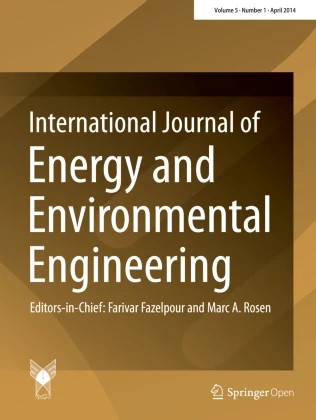Analyzing the amount of radiation absorption related to the form of Ab Anbars dome in a hot and dry climate in Yazd
- Department of Architecture, Faculty of Architecture and Urban Planning, Jundi-Shapur University of Technology, Dezful, IR

Published in Issue 2021-11-01
How to Cite
Shiri, T., Didehban, M., & Taban, M. (2021). Analyzing the amount of radiation absorption related to the form of Ab Anbars dome in a hot and dry climate in Yazd. International Journal of Energy and Environmental Engineering, 13(3 (September 2022). https://doi.org/10.1007/s40095-021-00437-6
Abstract
Abstract Ab Anbars were used in most areas of Iran, especially in hot and dry climates, to keep water cool. The dome of Ab Anbars had varying heights and forms used to cover the reservoir. The present study conducted an experimental and numerical review of five sample Ab Anbar domes of different structures from a hot dry climate in Yazd. To conduct the research, Tg and Ta parameters inside and outside the domes were simultaneously taken from morning to evening with two data loggers on the hottest days of the year, while during the day, the surface temperature was exposed to radiation and dome shadow were captured using a thermometer. For validation, samples of the fixed span were modeled in Rhinoceros5 software and tested with Radiance Engine of solar radiation analysis algorithm on the hottest day of the year in three intervals of 2,4, 6 p.m. in order to identify the most suitable dome in terms of heat reception for hot and dry climates. The findings indicated that there was a good relationship between experimental and simulation data. The amount of sunlight reception on the dome surfaces varied in each time interval. The discrepancy level of Tg and Ta parameters inside and outside high-rise domes was found to be lower than that of low-rise domes, as low-rise domes absorbed more heat and stored it inside. Therefore, high-rise domes were among the most suitable covering areas for Ab Anbars in the hot and dry climate of Yazd.Keywords
- Ab Anbar Dome,
- Sun radiation,
- Radiance,
- Hot and dry climate,
- Yazd
References
- Oroud (2015) Water budget assessment within a typical semiarid watershed in the eastern Mediterranean 2(2) (pp. 395-409) https://doi.org/10.1007/s40710-015-0072-8
- Fanood (2014) The role of four key structures in the creation and survival of cultural landscapes in the desert environment of Iran 20(3) (pp. 184-196) https://doi.org/10.1080/13556207.2014.985490
- Esmaeili and Vazirzadeh (2009) Water pricing for agricultural production in the south of Iran 23(5) (pp. 957-964) https://doi.org/10.1007/s11269-008-9308-y
- Onder and Yilmaz (2005) Underground dams 11(12) (pp. 35-45)
- Ghobadian (2014) University of Tehran
- Memarian, G.H.: Architecture of water reservoirs in Qazvin. Work (35) (2009).
- Memarian, G.H.: A Journey in the Architecture of Yazd Reservoirs. Tehran: Iran University of Science and Technology (1993).
- Kasmaei (2009) Khak Publishing
- ArefmaneshDehghanDehghani (2008) Thermal characteristics of an underground cold-water reservoir: analytical and experimental studies (pp. 3261-3265) https://doi.org/10.1016/j.applthermaleng.2009.03.010
- Bahadori neghad, M.N.: Passive Cooling systems. Iran. Architect. Sci. Am.
- 238
- , 144–154 (1978).
- Bahadori and Haghighat (1986) Thermal performance of adobe structures with domed roofs and moist internal surface (pp. 365-375) https://doi.org/10.1016/0038-092X(86)90154-4
- Victor Gomez et al. (2003) Solar performance of Hemispherical vault roofs (pp. 1431-1438) https://doi.org/10.1016/j.buildenv.2003.07.005
- Velayati, E., Yaghoubi, M.: Analysis of wind flow around various Domed-type roofs. IMEC, Kuwait. December (2004).
- Sabzevari and Golneshan (1989) Solar radiation intensity on domed roofs (pp. 625-647) https://doi.org/10.1016/0741-983X(90)90038-4
- Faghih and Bahadori (2009) Three-dimensional numerical investigation of air Flow over domed roofs (pp. 161-168) https://doi.org/10.1016/j.jweia.2009.10.012
- Asfour and Gadi (2007) Using CFD to investigate ventilation characteristics of Vaults as wind-inducing devices in buildings (pp. 1126-1140) https://doi.org/10.1016/j.apenergy.2007.10.015
- TavakolYaghoubiMasoudi Motlagh (2009) Air flow aerodynamic on a Wall-mounted hemisphere for various turbulent boundary layers (pp. 538-553) https://doi.org/10.1016/j.expthermflusci.2009.11.007
- Khoshab and Dehghan (2014) Numerical simulation of mixed convection airflow under a dome-shaped roof (pp. 1359-1374) https://doi.org/10.1007/s13369-013-0705-z
- DehghanDehghani (2010) Experimental and theoretical investigation of thermal performance of underground cold-water reservoir (pp. 816-824) https://doi.org/10.1016/j.ijthermalsci.2010.12.007
- Yaghoubi (1991) Air flow patterns around domed roof buildings (pp. 345-355) https://doi.org/10.1016/0960-1481(91)90043-O
- Hadavand et al. (2007) Thermal analysis of vaulted roofs (pp. 265-275) https://doi.org/10.1016/j.enbuild.2007.02.024
- Najafi, N., Alipore, A.S., Najafi, M.A.: Passive thermal performance increase in cisterns. J. Homepage Www. IJEE IEE Foundation org
- 5
- (2), 269–274 (2014).
- Najafi and Yaghoubi (2015) Thermal study of a cistern's dome (the case of Motamed cistern in Lar, Iran) (pp. 453-466) https://doi.org/10.1016/j.enbuild.2015.06.015
- KämpfMontavon and BunyescBolligerRobinson (2010) Optimisation of buildings’ solar irradiation availability 84(4) (pp. 596-603) https://doi.org/10.1016/j.solener.2009.07.013
- Xu, S., Huang, Z ., Wang, J ., Mendis, T ., Huan, J.: Evaluation of photovoltaic potential by urban block typology: a case study of Wuhan, China. Renew. Energy Focus
- 29
- , 141−147 (2019). Doi: 10.1016/j.ref.2019.03.002
- Olivieri, F., Cocci Grifoni, R., Redondas, D., S´anchez-Res´endiz, J.A., Tascini S.: An experimental method to quantitatively analyse the effect of thermal insulation thickness on the summer performance of a vertical green wall. Energy Build.
- 112
- , 965–982 (2017). Doi:
- https://doi.org/10.1016/j.enbuild.2017.05.068
- Robinson, D., Stone, A.: Irradiation modeling modeling made simple: the cumulative sky approach and its applications. In: PLEA2004—The 21 st Conference on Passive and Low Energy Architecture. Eindhoven, the Netherlands. 19–22 September 2004.
- Zhang et al. (2016) Shape optimization of free-form buildings based on solar radiation gain and space efficiency using a multi-objective genetic algorithm in the severe cold zones of China (pp. 38-50) https://doi.org/10.1016/j.solener.2016.02.053
- Roudsari, M.S., Pak, M.: Ladybug: a parametric environmental plugin for grasshopper to help designers create an environmentally-conscious design. In: France 25
- -
- usepackage{amsmath}
- usepackage{wasysym}
- usepackage{amsfonts}
- usepackage{amssymb}
- usepackage{amsbsy}
- usepackage{mathrsfs}
- usepackage{upgreek}
- setlength{oddsidemargin}{-69pt}
- begin{document}$$-$$end{document}]]>
- th Aug 2013.
- http://www.ibpsa.org/
- proceedings/BS2013/p_2499.pdf.
- Kumar and Kumar (2017) An efficient parameters extraction technique of photovoltaic models for performance assessment (pp. 192-206) https://doi.org/10.1016/j.solener.2017.09.046
- https://earth.google.com/web/search/yazd+iran
- https://www.rhino3d.com
- https://inspectusa.com/heat-index-wet-bulb-globe-thermometer-wbgt-2010sd-logging-p-1795.html
- .
- https://www.geekbuying.com/item/Infrared-Thermometer-Armed-With-Non-contact-Thermometer-Laser-Contactless-High-Temperature-Gun-GM300-345572.html
- https://www.ladybug.tools/epwmap
- https://www.grasshopper3d.com

 10.1007/s40095-021-00437-6
10.1007/s40095-021-00437-6











